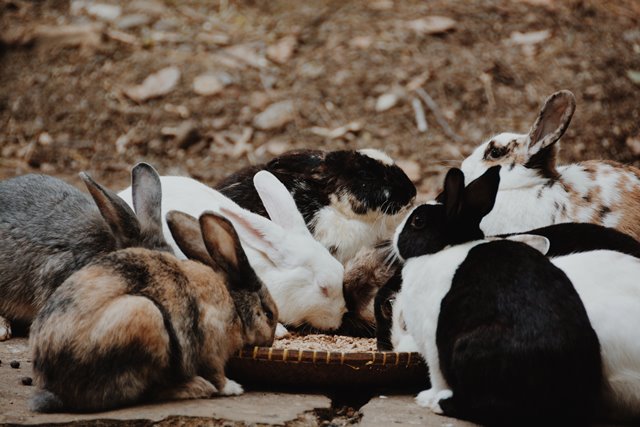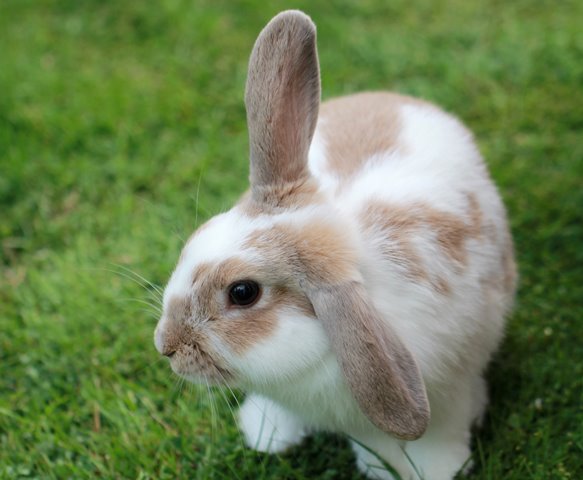Your rabbit’s gut
Upset to your rabbit’s gut bacteria may result in upset to your bunny Bunnies rely on their microbiota (gut bacteria) to aid digestion of the high volumes of plant matter that they consume. If they develop an imbalance in their gut bacteria, known as a dysbiosis, this can have significant consequences on their normal digestion […]
Upset to your rabbit’s gut bacteria may result in upset to your bunny
Bunnies rely on their microbiota (gut bacteria) to aid digestion of the high volumes of plant matter that they consume. If they develop an imbalance in their gut bacteria, known as a dysbiosis, this can have significant consequences on their normal digestion and absorption of nutrients and their gut motility. This may result in a lack of appetite, discomfort and even gut stasis (a very serious condition where the rabbit’s digestive system slows down or stops working altogether).
Take a look as we explore some of the many reasons why a rabbit may develop a dysbiosis!
Stress
Rabbits are fairly sensitive creatures, and can easily become stressed. Stress itself can upset the delicate balance of the gut bacteria and result in a dysbiosis. But what may cause a bunny to become stressed?
Risk of predators
As herbivores in the wild, bunnies are prey animals; the presence of predators nearby is understandably very scary for them. Foxes passing near to your garden or even over-exuberant dogs and cats can cause significant fear to a pet rabbit.
Stress minimising tip:
Be mindful of this. Keep bunnies well out of reach of potential fox intruders at night. If you have dogs and cats, do not let them terrorise your rabbit. While a fence may mean that they cannot do any physical harm, the stress to the rabbit can be both unpleasant and detrimental to their health.
Loud noises
Sudden, unexpected loud noises can be stressful to a rabbit as they interpret them as a potential threat. Fireworks in particular, but even nearby building work, hedge-trimming, lawn-mowing etc. could be a stressful experience for a rabbit.
Stress minimising tip:
Avoid fireworks in your own garden if you have a rabbit (or any pet!), consider bringing them indoors around firework night. If you know that there will be noisy building work or gardening then consider moving their hutch/pen away from the noise.
Bonding issues
While rabbits are inherently sociable animals, bonding pairs takes time and patience. New rabbits housed together suddenly are likely to fight, and the less dominant bunny may suffer not only from physical injuries but also may develop a stress-induced dysbiosis.
Stress minimising tip:
Bonding bunnies is a gradual, slow process. Seek advice from your vet or the RWAF (Rabbit Welfare Association & Fund) prior to doing this.

Loss of a companion:
As mentioned previously rabbits are inherently very sociable animals, and once bonded they gain great comfort from their companion. It’s therefore unsurprising that the loss of a companion can be stressful for a rabbit and leave them looking quiet, and perhaps a little depressed.
Stress minimising tip:
Give them time to come to terms with the loss. Consider finding a new companion to bond them with.
A trip to the vets
While some dogs and cats may enjoy going to the vets, this is pretty rare in rabbits. A move away from their home environment, a trip in the car, a noisy waiting room, unusual smells, and being handled can all be stressful activities even on their own. So, when combined, a trip to the vets can be pretty stressful for a bunny.
Stress minimising tip:
Ensure all handling is done gently, slowly and quietly. Try to minimise their exposure to loud noises, and certainly keeping them out of sight of other animals in the waiting room. Find out if the vet practice has special sessions for rabbits and ‘exotic’ species of animal. Ask if you can wait in the car or outside with your rabbit until it’s time to be seen. Travel with some of their normal bedding and food and with their companion if possible.
Sudden temperature changes
Outdoor bunnies can be exposed to sudden variations in ambient temperature which they may struggle to cope with.
Stress minimising tip:
Consider bringing them inside in extreme weather conditions where they can be kept at a more normal temperature. If moving a rabbit between inside and outside try to change their temperature gradually, e.g via an outbuilding/ shed/ conservatory etc. Rather than suddenly moving them from freezing temperatures outside into a heated house.
Pain
Pain is never pleasant, and the stress caused by this may result in a dysbiosis. As with any animal, rabbits may experience all types of pain, however, sources of pain particularly common to rabbits are:
- dental (toothache)
- aural (earache)
- abdominal (tummy ache)
- arthritis (joint pain)
- urological (bladder, e.g due to crystals, sludge or infection).

Dietary indiscretion
A sudden change in the diet which your rabbit is fed may result in changes to the gut bacteria present i.e. a dysbiosis. In particular, high sugar treats are likely to result in a dysbiosis. If you want to give fresh fruits and vegetables, check that they are appropriate for rabbits and offer them only in moderation. Visit the RWAF for a recommended list of bunny suitable vegetables and herbs.
Lack of fibre
Fibre makes up a large part of rabbits’ diets. With the help of the gut bacteria and caecotrophy (eating their own poos!), they are able to extract energy and nutrients from their plant-based, high-fibre diet. While the rabbit relies on the microbiota to help digest the fibre, the gut bacteria rely on the rabbit to consume adequate fibre in the first place. Insufficient dietary fibre intake may result in changes to the bacterial populations present within the gut, hence causing a dysbiosis. Furthermore, rabbits also rely on high fibre intake to keep the food moving along the guts, by a process known as peristalsis. A lack of fibre may result in reduced peristalsis, and eventually gut stasis, which can be very dangerous to a rabbit.
Antibiotics
Since we are talking about live bacteria when we discuss the microbiota, it is not surprising that the use of antibiotics can kill off some of the resident gut bacteria (as well as the infection for which the antibiotic was prescribed), resulting in a dysbiosis.


